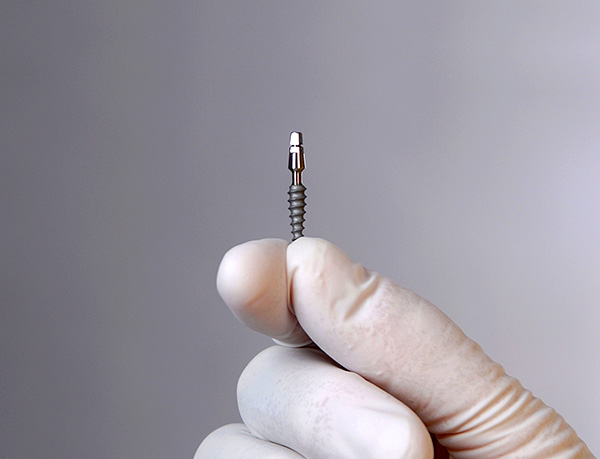
Despite the страш horror stories ’still circulating among the people regarding dental implantation (they say, it is terribly harmful and there are many contraindications to it), today implant placement can be considered even less traumatic than, for example, removing complex wisdom teeth. That is, relatively speaking, in 95% of cases there is no question of any terrible torment and “tin”: modern dental implants are relatively painless to install, do not harm the human body and can last for decades, as evidenced by numerous reviews by both doctors and and grateful patients.
However, why, then, the installation of implants by some people is considered harmful and dangerous to health - because, probably, it was not just that such an attitude arose?
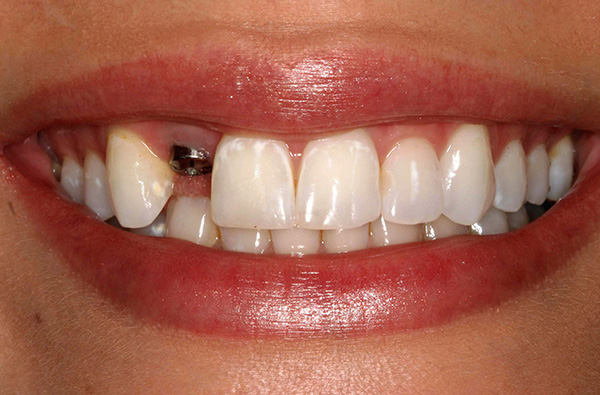
Indeed, dental implantation, being essentially a surgical operation, in some cases is associated with rather complex, traumatic and lengthy manipulations of a dentist-surgeon (implantologist). As with any operation, not always everything goes smoothly - various complications and not very pleasant consequences may well be.
In addition, there are certain contraindications to the installation of implants and a list of diseases, without which the implantation can have a negative effect both on the general condition of the body during and after implantation, and on the implanted teeth themselves (inflammation and suppuration in the area of installed implants, their mobility, rejection and other harmful effects). Such reviews, which are sometimes found on popular forums, just the same way support the popular opinion about dental implantation as a harmful and very dangerous procedure for health.
About whether the installation of dental implants is really a harmful procedure, what unpleasant consequences can be observed, what problems can occur due to the fault of the patient and the doctor’s fault - we will talk about all this in more detail ...
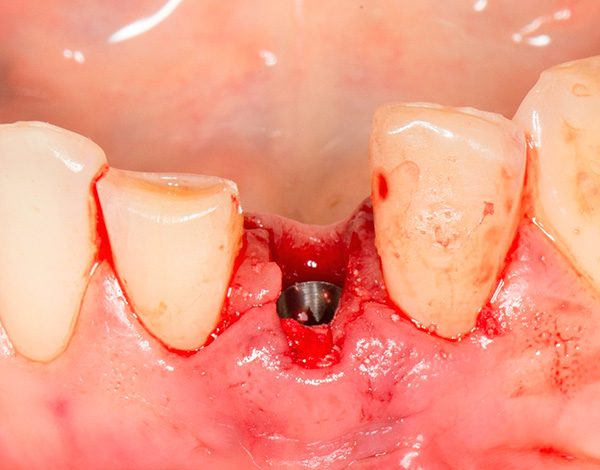
Feedback:
“I want to tell everyone my story so that no one else gets into the same difficult situation because of their own stupidity. About 3 years ago, I wanted to insert implants, since there was nothing to chew, and I did not want to wear false jaws, like my grandmother’s. At that time, I had a malignant tumor in the jaw, but small in size, so I was actively treated at my own expense in the oncology center.
I perfectly understood that my tumor could scare away the doctor, and with a false jaw I was not at all rational to walk, so I did not say anything about my illness. The implants were delivered quickly, all that was left was to wait for them to take root. At this time, I was just undergoing a course of radiation therapy, and irradiated the place where there were several implants. Most of the screws were torn off. Later they explained to me that it was necessary to immediately say what and how in reality: the rays interfere with the process of bone-metal fusion. In general, they told me that I myself was bursting, and (of course) they altered everything for my own money. It took a whole year for my dentist and oncologist to jointly solve the problem with new teeth. In short, I warn everyone: it’s better to tell the doctor everything right away, as it is, otherwise it will turn out either like mine or worse. Do not risk your health! "
Victoria, Moscow, 47 years old.
Five fictional horror stories about implants
If an unprepared person reads some, to put it mildly, not quite professional articles on pseudo-dental sites, as well as reviews and discussions on forums, then he may be horrified by the information, which in essence is often far from medicine.Cases in which poorly placed dental implants were detrimental to the patient’s health are often described in a grotesque manner, and here are speculations and fears presented in the form of truth.
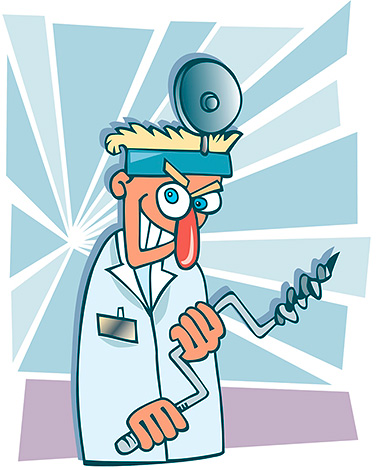
In general, people who have not yet become happy owners of implants, but just thinking about it, may be afraid to go to the implant dentist even just for a consultation.
Let's look at 5 famous horror stories on this topic.
Myth No. 1: dental implants can be “wrapped” so that they damage the orbit of the eye
In fact, it is impossible to damage the orbit of the eye with dental implants for a number of reasons: the controlled length of the implants, monitoring the distance to important structures of the maxillofacial region according to the images, the experience and common sense of the doctor, etc.
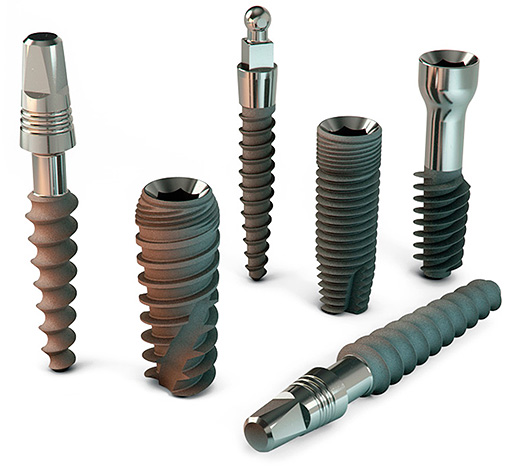
Meanwhile, there are really rare cases of damage to the maxillofacial structures close to the implantation zone. According to statistics, the following complications can be distinguished by the frequency of occurrence:
- Damage to the maxillary sinus;
- Violation of the mandibular nerve;
- Exit of the implant into the hyoid space;
- The exit of the implant into the nasal cavity.
Each of these complications is rare during implantation, while the first place in the frequency of three is occupied by the “penetration” of the implant into the maxillary sinus. Currently, such cases are becoming less and less due to careful monitoring and control of the maxillary sinus distance from digital images in different projections, as well as due to the wide possibilities for building extra bone (sinus lift). All this is used by professional dentists as part of the prevention of possible complications.
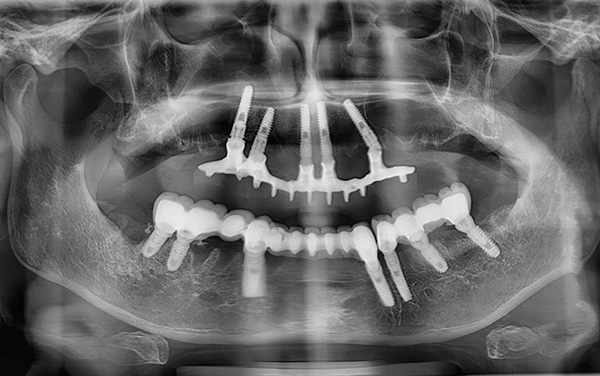
Feedback:
“He put himself an implant in Simferopol and was completely satisfied. Most importantly, nothing came out of the nose, like in others, does not flow, lips and cheeks are not swollen, like in a hamster, and the mood is good. It has been 7 days since the screws stuck, but I'm fine, although I thought it would hurt a lot. The only thing that bothered was the delivery of tests and a long preparation for implantation. I can say right away that I was lucky with the dentist, as he explained everything to me in an accessible way, and what will happen. That not only depends on him, how the implants will behave in the future, but also on my good behavior.
In general, men, do not be afraid - this is not scary. The main thing is to find out thoroughly about the clinic and the doctor who implants the implants in the jaw, do not sign anything, if you have not examined them in detail, learn about guarantees in advance. I was given a contract with a guarantee, so you can sleep peacefully. It’s only good and regular to clean all this, otherwise it will fly out in a few months with the jaw to such and such a mother. ”
Sergey, Simferopol
Myth # 2: dental implants always hurt
The process of implantation in terms of anesthesia is almost no different from anesthesia when removing teeth, adjusted for the fact that in some cases a phased “freezing” (local anesthesia) of different areas of the jaw is required. The modern level of anesthetics allows you to individually select the drug that is suitable for each specific person, as well as anesthetize in various ways that are most adapted to achieve 100% pain relief. Fortunately, there are many such options, especially in the framework of large dental clinics.
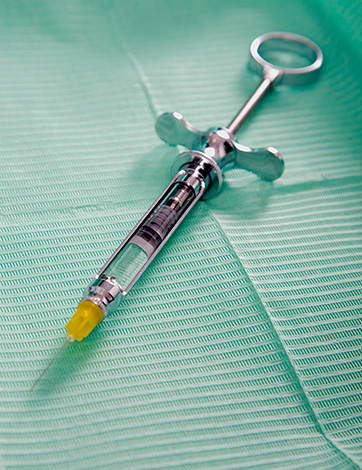
In fact, most of the reviews just show that the installation of implants takes place without much pain.
If there are contraindications for local anesthesia and (or) indications for anesthesia, then implantation is performed with a loss of consciousness. The most important plus in this case is that with such an operation, you can give a full guarantee that when installing implants during sleep, the patient will not feel any pain or any unpleasant emotions associated with the type of dental instruments (some sensitive people are afraid not only of pain, but also the type of blood, instruments, as well as unpleasant sounds - drilling, crunching, etc.).
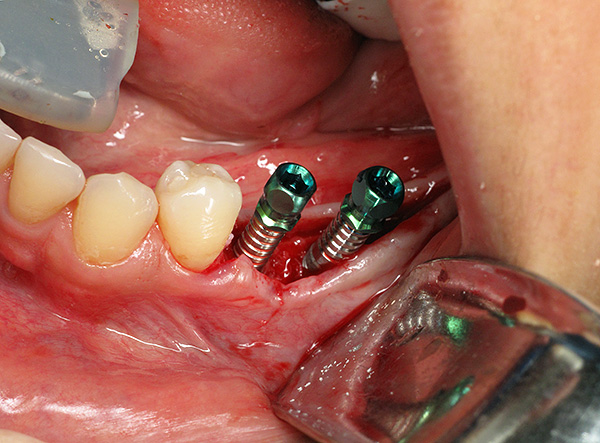
On a note
Under local anesthesia, it doesn’t hurt in about 95-98% of cases, since it is necessary to take into account not only the professionalism of the doctor and the level of the clinic, but also the anatomical features of the jaw of a person, individual characteristics of the nervous system, as well as some related factors (alcohol, drugs, stress, panic fears, current medication, etc.).
Myth # 3: dental implants are always placed under anesthesia, and anesthesia is bad for the brain.
In practice, this is the case: the installation of dental implants is most often carried out under local anesthesia, when a person is conscious from the beginning to the end of the procedure and can directly or indirectly control the situation. Anesthesia, on the other hand, is a good alternative in cases where local anesthesia either does not give a result or can even cause harm to the patient during the installation of dental implants due to contraindications.
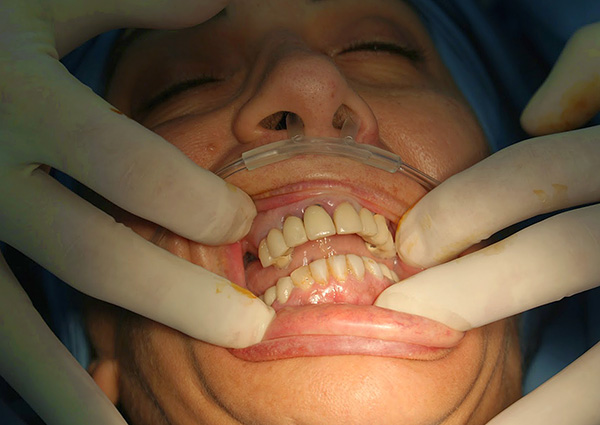
In those cases when a person insists on anesthesia on a whim, withholding his current diseases from the doctor, the consequences can be very different, including very harmful to health and even life-threatening. Be that as it may, a highly professional doctor will do everything in his power to prevent possible complications during and after implant placement, and choose the appropriate tactics regarding anesthesia - it is important only to cooperate with the doctor, not hiding information about your health from him, however insignificant it may seem to you.
There is an opinion that anesthesia causes significant damage to the brain, impairs memory and, on the whole, reduces a person’s intellectual abilities. And although you can really find a lot of such reviews on the Internet, nevertheless, most experts consider horror stories about the dangers of anesthesia as nothing more than a myth.
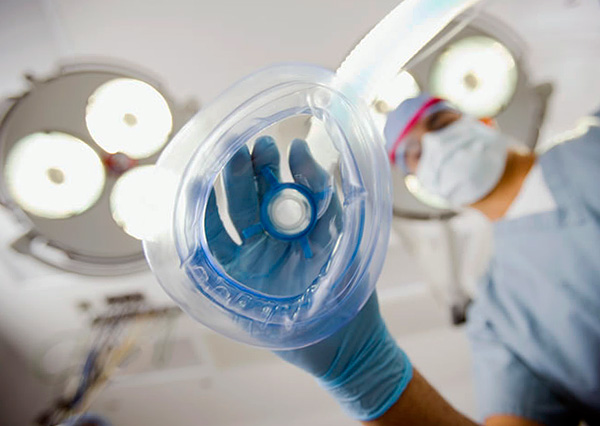
Feedback:
“I will share my personal experience. I underwent four operations on internal organs, all of them were performed under general anesthesia. After all this, my memory began to fail often, I became very forgetful. Sometimes in general memory lapses occur. And they began to often suffer headaches. ”
Oksana M., St. Petersburg
Doctor's review:
“As a person who uses anesthesia up to 5 times a day, I can say that he does not affect the brain, even if done in old age. Yes, in such patients, exacerbation of encephalopathy sometimes happens after anesthesia, but after about a week it goes away. In general, there are no such drugs that we use and which would lead to some irreversible changes in the functioning of the brain. So the damage from anesthesia is more in the liver and kidneys than in the brain, but the body quickly copes with this. ”
Sergey, Moscow.
Myth No. 4: after implantation, the gums always hurt for a long time, the cheek swells, blood flows from the mouth for a long time
In the first hours after implant placement, when the action of the anesthetic ends, a painful reaction and discomfort are really possible. Slight swelling and minor spotting may also occur. To reduce the severity of these consequences, an experienced implantologist always prescribes a complex of drugs that exclude or reduce the body's response to the traumatic factor.
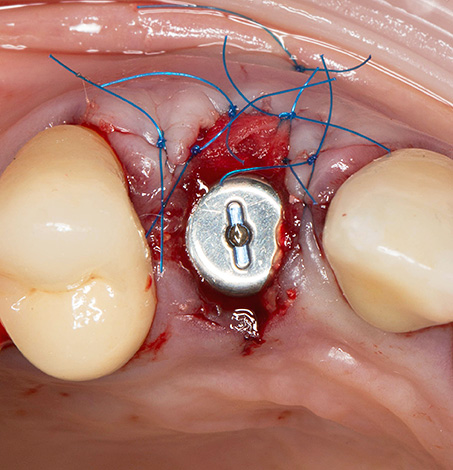
In rare cases, there may be prolonged pain, significant swelling and bleeding, which, with concomitant additional signs (fever, prolonged numbness of the jaw, suppuration from the gums, bad breath, etc.) is a dangerous complication, which is likely to be associated with incorrect doctor’s tactics. Turning to the attending physician on time, you can almost always quickly solve the problem, avoiding further harm to health in case of problems with the installed implant.
Myth No. 5: implants are sometimes rejected, and when they are rejected, jaw gangrene occurs.
In fact, even if the implant was not installed correctly and the doctor made many mistakes, jaw gangrene does not develop. In the worst case, inflammation and suppuration occurs in the implantation zone, the implant becomes mobile and rejected. It is impossible not to notice this, and pain in the early stages simply force the patient to consult a dentist again.
The photo below shows the implants removed from the jaw:
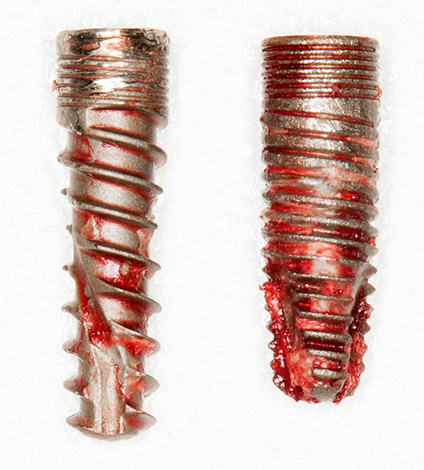
In those small situations where, for some reasons, depending on or not depending on the doctor, the implants installed in the jaw are rejected, a banal decrease in bone tissue occurs. Such a decrease in bone in the future can be quite easily compensated for by its artificial restoration using a bone graft.
If you analyze popular reviews on the Internet about dental implants, you can see that sometimes minor complications do not harm human health and can easily be overcome by the body against the background of drug therapy recommended by the implantologist. Here is an example of such a review:
Feedback:
“... Two months ago after installing the implants, I had a complication of such a plan: next to one implant, the gums were swollen so much that the cheek was directly inflated. I went to the clinic again. There, they opened my gum and cleaned it, prescribed rinses. Now, thank God, everything is fine! New teeth have already taken root and I no longer feel any problems. ”
Veronika, Neftegorsk
When implants do not need to be placed at all: absolute contraindications for implantation
Any surgical intervention has its limitations, and in this regard, dental implantation is no exception. Meanwhile, there is no consensus on the exact list of diseases that determine contraindications for implant placement.
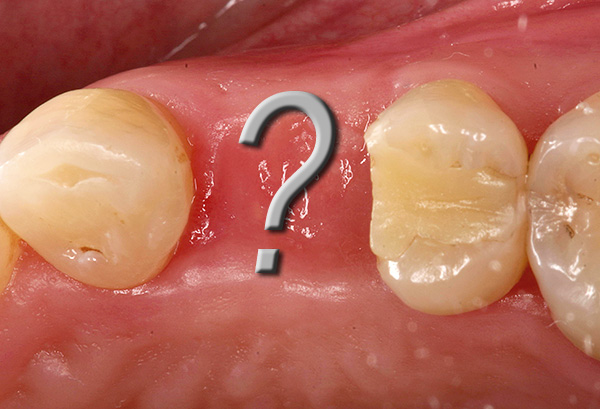
Firstly, this is due to the fact that all contraindications are divided into relative (surmountable under certain conditions) and absolute. Secondly, due to the fact that modern medicine does not stand still, the indications for implantation are expanding every year, and those contraindications, ignoring which earlier could directly or indirectly harm health during and after implant placement, are now overcome with the help of latest technologies and drugs.
Today, most experts are of the opinion that dental implantation is not recommended for:
- Severe diseases of the cardiovascular, endocrine and nervous systems;
- The presence of malignant tumors;
- Certain blood diseases;
- Chronic renal and hepatic insufficiency;
- Allergies to local and general anesthesia drugs;
- Chronic alcoholism and drug addiction.
However, if you read the reviews and comments of famous dentists in the field of implantation, you can see that even the above contraindications are not always an obstacle to the installation of dental implants. Today, those diseases or bad habits that used to be absolute contraindications to implantation are no longer always an obstacle to a beautiful smile and the ability to chew food normally.
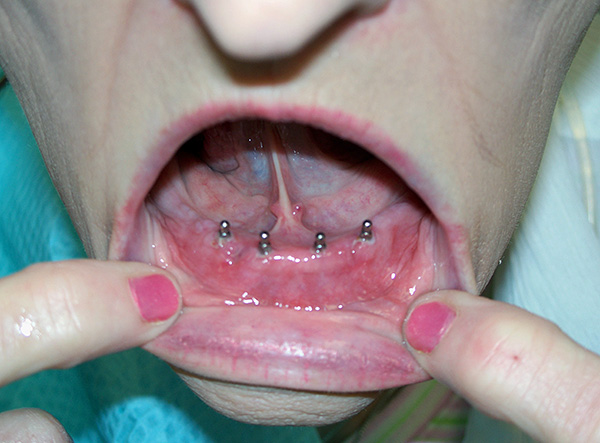
For example, under certain conditions, implant placement is possible in the following cases:
- In old age;
- In diabetes mellitus type 2 (sometimes type 1) in the stage of compensation without disturbing metabolic processes in the bone tissue;
- After heart attacks and strokes;
- When using a pacemaker;
- After oncology;
- At smokers.
There are two main reasons that make a doctor refuse to implant:
- Acute and (or) severe forms of diseases, especially in decompensated form;
- And also with serious violations of tissue regeneration.
However, this also does not mean that the installation of implants will be put an end to forever. For example, acute respiratory viral infections, an acute respiratory viral infection, at the height of the disease will be a contraindication to dental implantation.And this is quite obvious: against the background of lowered immunity, with a high fever, runny nose, cough and sore throat, it is impossible to carry out high-quality implantation, since this is likely to adversely affect the already unsatisfactory condition of the patient. However, within 1-2 weeks after recovery, the installation of implants can very well be carried out without any harm to health.
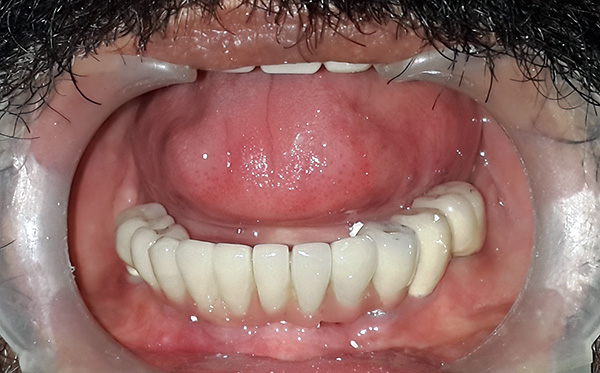
As for violations of tissue regeneration, this primarily affects the possibility of integration (engraftment) of the implant in the bone. Often there are situations when this opportunity tends to zero. For example, if a person undergoes radiation therapy during oncology in the maxillofacial region, the regeneration of bone tissue in the implantation zone will be impaired, therefore, implants with almost 100% probability will be rejected in the near future after their installation.
Feedback
“I was scheduled to insert the implants up and down + still do gum correction, because after removing the teeth, my wounds healed very unevenly due to suppuration. In short, they will insert four implants at the top and the same number at the bottom. I’m a little afraid, although the operation will be anesthetized, so I’ll sleep and not think about anything. The only thing that’s bad is my type 2 diabetes mellitus, and sugar sometimes rolls over 20, this can affect how the implants heal. But my doctors encouraged me and told me not to be afraid: I was not the first one with such an illness. Let's hope that everything goes on 5+! ”
Elena, Moscow
Dental implantation and pregnancy
Some specialists respond against dental implantation during pregnancy, since the process of installing dental implants with a certain probability can cause harm to the expectant mother, and through her condition - harm to the developing fetus.

Generally speaking, pregnancy is only a relative contraindication to implantation, and established and normally accepted implants by themselves do not negatively affect the health of the expectant mother and fetus.
Nevertheless, when installing dental implants, two main potentially harmful factors for the health of a pregnant woman and fetus can be distinguished:
- Drug therapy;
- X-ray radiation.
With the second point, everything is clear: before and during implantation, it is required to carry out diagnostics and quality control of the installed implants, and for this, dentists take pictures of the teeth. This can be a CT scan (computed tomography), panoramic radiography or intraoral contact radiography. Be that as it may, the harmful effects of x-rays during pregnancy are not warranted (with the exception of some emergency cases).
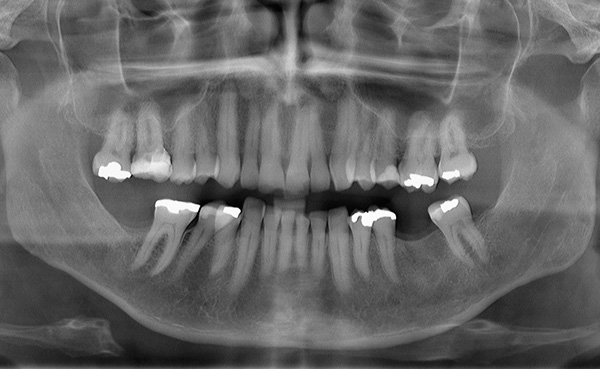
Drug therapy is carried out at the first stage of implantation, when it is required that the body perceive the foreign intervention adequately and the person feels as comfortable as possible. For this, antibiotics, analgesics, antihistamines, and also topical drugs (for the oral cavity) are usually prescribed. Moreover, most of the drugs from this list are contraindicated for pregnant women, so it would be a wrong decision to risk the health of the unborn child due to planned dental implant surgery.
On a note
There are cases when dental implantation for a pregnant woman is urgently needed, especially in situations where nothing but implants can be offered. For example, if a pregnant woman received a mechanical injury that caused the extraction of the front tooth, then the so-called immediate implantation can be performed when implants are installed in a short time together with aesthetic crowns (usually temporary). Depending on the chosen method, this process can take from 3-5 days to 2-3 weeks.And here it is necessary to decide, first of all, wash off the woman - whether she is ready to walk for several months without front teeth or still risk the fetal health (even if the risk is insignificant) and install the implants immediately.
Implantation for the cores: harm or benefit?
Cardiovascular pathologies “scare” many implantologists as much as situations with pregnant women who seek help. Of course, no doctor wants a patient who recently suffered a heart attack or stroke to die in his chair, and the reputation of the clinic and the specialist himself has died. But what can people with cardiovascular diseases do who have the opportunity to have dental implants and get rid of problems with a constantly falling and (or) inconvenient removable denture?
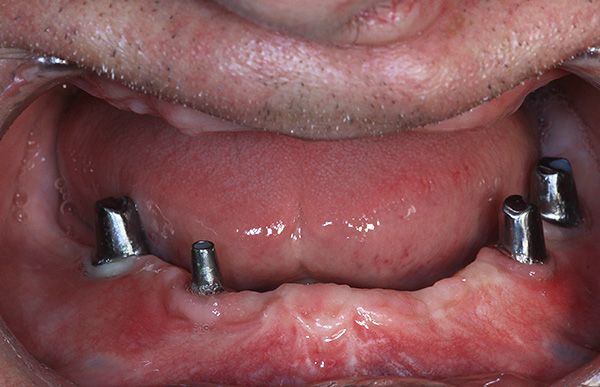
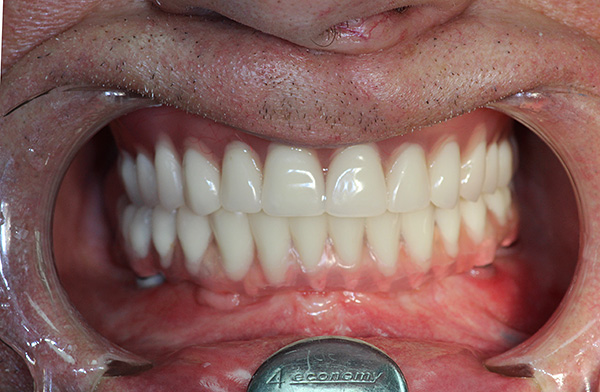
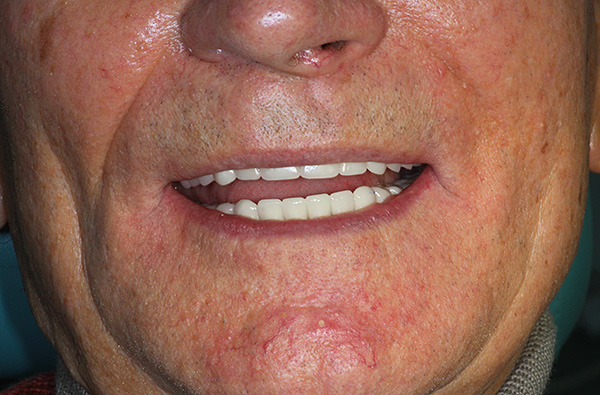
We will immediately deal with acute forms of the disease: with no cardiovascular pathology in the acute stage does the dentist install implants, since the potential damage from the operation is too great (for example, death). But in the compensation stage, implantation can be performed in almost any cardiovascular disease, but again only if comprehensive health monitoring has been carried out and, if necessary, approval has been obtained from the attending physician (therapist, cardiologist, etc.). In rare cases, the practice of cooperation of the dentist with specialists from cardiology centers is used to ensure complete safety of the procedure.
On a note
The quality of life of any person, not least depends on the condition of the maxillofacial region. Often with violations of normal chewing, write to the heart and blood vessel diseases a whole bunch of diseases of the digestive tract joins (not to mention psychological problems and nervous disorders due to the “false jaw” and toothless mouth).
Often for "cores" from the risk category, the dentist chooses a basal implantation, which is carried out in a short time (for 3-5 days). With some of its drawbacks, this type of implant placement allows you to reduce the time spent by the weakened patient in the chair and quickly returns to a normal and full life in society.
What can objectively affect the quality of work of a doctor
First of all, it is necessary to understand that not even the most first-class implantologist can cope with his work if certain conditions for his work are not created. Most often, the quality of a doctor’s work is affected by:
- Clinic equipment level;
- Sterility of the cabinet, equipment and tools;
- Characterization of implantation instruments;
- Dental implants used in the work (and they come in different price categories and, accordingly, of different quality).
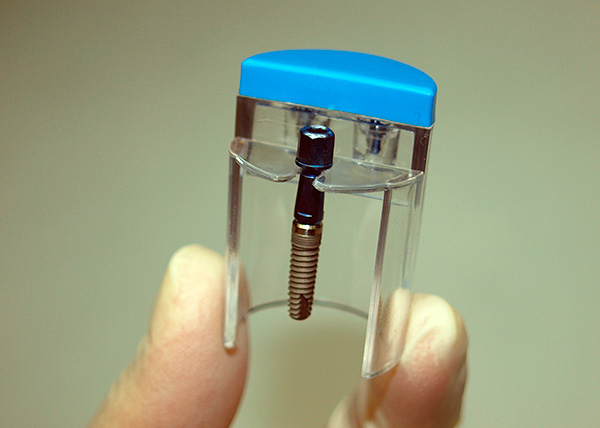
In other words, one can hardly count on the successful installation of implants in unsanitary conditions, with blunt cutters, drills, dubious Chinese implants, etc. The statistics of successful operations are affected by all the little things: from a disinfectant for room treatment to choosing a manufacturer of the implant system. And if the clinic is trying in every possible way to save on purchases, then most often this leads to an increase in the likelihood of complications during and after implantation.
To prevent this from happening with you, you need to take a responsible approach to choosing a dental blade: analyze reviews (both positive and negative), take into account the recommendations of your friends and relatives, as well as draw certain conclusions at a consultation with a potential attending physician. If there is the slightest suspicion regarding the qualifications of a specialist, the level of equipment of the office, and even more so - violations that are visible with the eye, it is better to contact another clinic.
An example showing that different dentistry can vary quite a bit:
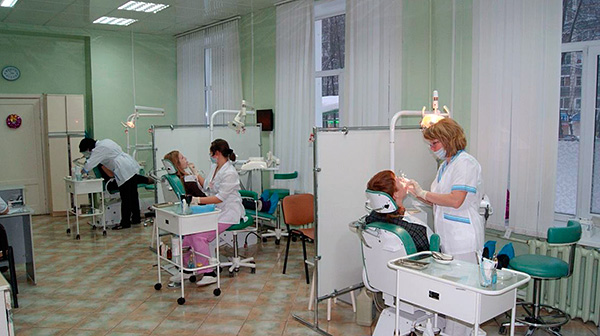
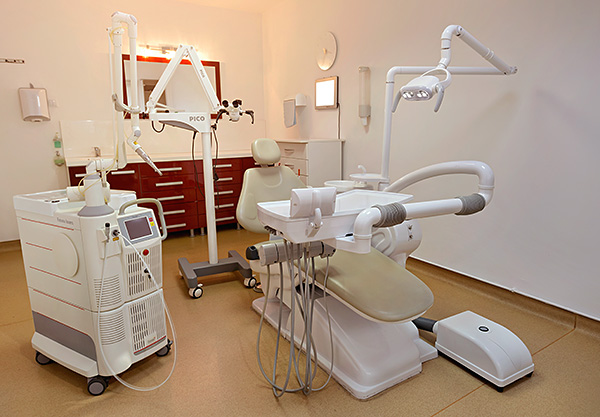
Feedback
“A year ago, I placed two implants. I must say right away - this does not hurt, but then within a couple of days there was a tumor that quickly disappeared. Implantation does not last long, I’m not even tired.It is important that a normal doctor gets caught: honest. If he is only interested in the contents of your wallet, he will drive and torment you thoroughly until all the money is pulled out, and his teeth will fail. In general, choose only an experienced and honest doctor. And my personal advice: put in implants if you don’t want to have problems ... "
Natalia, Murmansk
Problems with implants due to the fault of the person himself
Unfortunately, there are factors associated with the behavior of the person (patient) that can lead to problems with implants after their installation, regardless of the level of the clinic and the professionalism of the implantologist.
Among the main reasons for rejection of implants and the development of peri-implantitis due to the fault of the patient, when he harms himself, the following can be attributed:
- Ignoring doctor's recommendations;
- Poor oral hygiene;
- "Malicious" smoking;
- Lack of preventive visits to the doctor.
Moreover, most doctors tend to consider the first two points the most common provocateurs of problems with the tissues surrounding the implant.
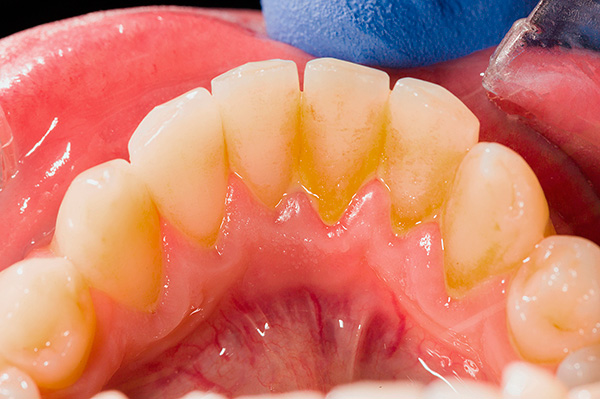
Poor oral hygiene causes an accumulation of plaque and stone on the installed implants, disrupting the gingival attachment and provoking inflammatory processes. In such a situation, their own teeth often become mobile against the background of periodontitis, and the implants also “get it” in full.
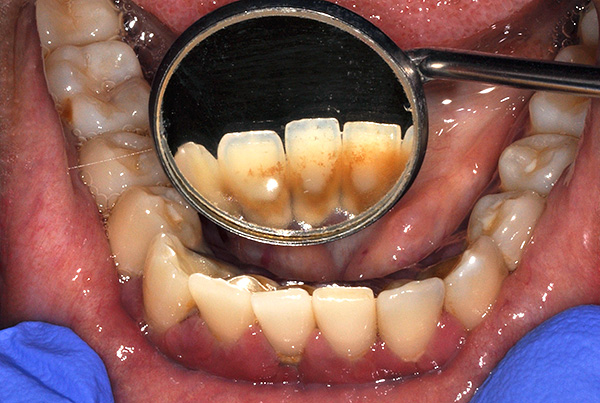
Feedback
“Girls, today the surgeon wanted to remove the gum formers, and there the plaque was thick in the finger. I didn’t touch them at all when brushing my teeth, he didn’t tell me anything, but how do I know that I almost needed to rub these things with a brush. Well, under them was blood and an unhealed sick gum. I am terrified, suffer pain. But everything turned out well in the picture: there is no inflammation in the bone. The doctor cleaned and put the shapers back, now in a week I’m going to him like a bayonet. Now I’m cleaning everything as it should and waiting for it to all end. ”
Tatyana, Yaroslavl
But regarding smoking, there are mixed opinions. Smoking in itself in most cases does not lead to problems with implants, but it is worth remembering that with inadequate oral hygiene, “malicious” smokers run the risk of periodontitis or periodontal disease, which often leads to peri-implantitis.
Some implantation techniques, such as basal implantation of teeth, are positioned as suitable for smokers. But in this case, one should not forget that the tissues surrounding the implant are still harmed by smoking, which creates additional risks of inflammation even when installing basal implants.
Be healthy!
If you have personal experience with any problems associated with the installation of implants, be sure to leave your review at the bottom of this page (in the comments box).
Interesting video: truth and fiction about dental implants
How much does dental implantation cost today?

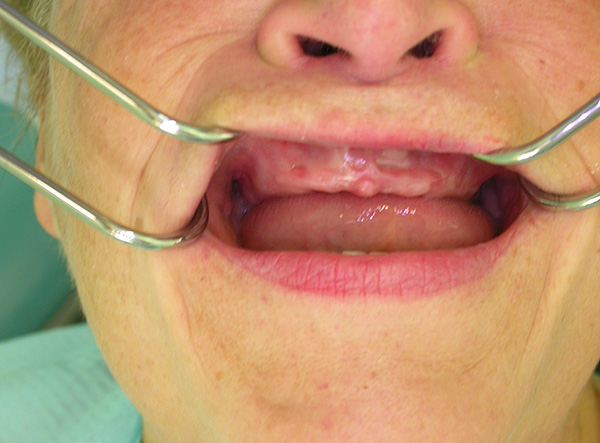

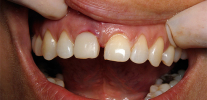
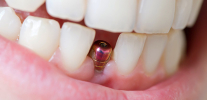
After implantation of the 6 and 7 upper teeth, a ringing in the head and neck pain appeared. What to do?
Hello Olga! To assess the condition of the dentofacial system and identify possible causes of the problem, you need to look at how the implants are installed on the CBCT (cone beam computed tomography of the teeth and jaw). It is impossible to answer your question without additional information, since it is unclear how the implants stand, whether you did sinus lifting and if there are any other important features. For example, it is possible that the bottom of the sinus has been damaged, or the implants create compression on the upper alveolar nerves, which, in turn, transmit a signal along the chain to other nerve processes.
I read the forums for a month before deciding which implants to put. This is a difficult choice ...
They don’t want to put an implant on me, because epilepsy. Middle Ages ... I have been preparing mentally for 2 months and am no longer afraid. With epilepsy do not put?
Good afternoon, Katerina! Your disease (epilepsy) today in many clinics is perceived as an absolute contraindication for dental implantation. Without going into the intricacies of treating this pathology in the Russian Federation, we can safely say that 75% of patients do not receive the necessary treatment. In our clinic, the approach to dental treatment in relation to each patient is individual, therefore, analyzing your problem, we would focus on the following:
1) Would appreciate the amount of work required to perform implantation;
2) Be sure to involve a neurologist for consultation with a conclusion on the possibility of implantation;
3) We would consider the use of sedation under the supervision of a team of anesthetists.
After that, a medical commission would be convened, according to the results of which a decision is made.
I placed implants under general anesthesia. Very satisfied.
How much did 1 tooth cost?
One tooth cost me 25 thousand, put the Israeli implants. Put a year ago, the tooth is excellent, very beautiful. It does not hurt, does not interfere, it performs its functions. And plus there is a lifetime warranty.
Good afternoon. I have the wrong bite, since childhood, my teeth are very crooked. At that time, for some reason, I decided not to put braces. And now I go this way, but my crooked teeth are already completely tired, I’m directly tired of it. Braces are not an option at all, they are already very uncomfortable, as I heard, and the result will have to wait a long time. Of course, I would like to quickly deal with this. I heard that instead of braces, you can make implants. Is it so? If you put implants, then, probably, I would like domestic ones. How much more implantation is priced?
Hello. Incorrect bite and curvature of the teeth can be corrected in various ways, while removing all teeth and installing implants is not necessary, since this is not an ideal solution in terms of aesthetics and, in addition, will force you to go through a surgery and lose your own teeth. Today it is possible to correct the curvature of the teeth by wearing removable transparent mouth guards, as well as various highly aesthetic bracket systems, including lingual (fixed from the inside of the dentition, and they are almost not noticeable).
Therefore, do not rush to remove your teeth and place implants - be sure to consult with an orthodontist.
Hello. I'm going to install implants on the entire upper jaw. But I have type 2 diabetes. I do not take insulin, only pills and a special diet. Is this a contraindication for implantation? I don’t want to put a prosthesis at all.
Hello.Diabetes is currently a risk factor, not a contraindication to implantation. This means that after consultation with the implantologist, you only need to inform your attending endocrinologist about the upcoming surgical intervention so that, if necessary, he makes adjustments to the drug regimen for the period before and after the operation.
Hello! Some dental clinics consider ankylosing spondylitis an absolute contraindication. Have you ever had patients with this diagnosis and is implantation possible in your clinic for such patients?
Hello Svetlana! Yes, patients with such a diagnosis are contacting us. After studying the clinical case, a consultation of doctors makes a decision about the possibility of implantation.
Ankylosing spondylitis is a contraindication for traditional two-stage implantation, but there is another method that successfully solves the patient’s missing teeth problem. Our clinic successfully uses innovative methods of one-stage (basal) implantation with immediate loading, allowing patients with this diagnosis to restore lost teeth.
They put implants on my upper jaw under local anesthesia, no general anesthesia. It was not painful at all.
Tell me, why does the Internet say that some doctors do not really approve of the method of basal implantation?
Hello, Vitaliy. I believe that the disapproval of this method of implantation is due to the fact that not all doctors have a professional knowledge of it. When performing basal implantation, a maxillofacial surgeon, in addition to basic training, requires special skills and knowledge, as well as extensive practical experience. In addition, the method recently appeared in Russia, and everything new, as you know, in the medical community is often questioned. However, basal or bicortical implantation exists and works, helping many desperate people find a beautiful smile. The ability to restore teeth in 3-4 days is the technology of the 21st century.
I also put the Israeli MIS implant on the 7 upper tooth. Everything went smoothly, already after consulting with a doctor and conducting all the examinations, tomography and other things, I did not worry about anything. The implant itself was placed for about 40 minutes, no surprises. Three weeks have passed while I have liquids and mashed cereals in my diet. But already used to the tooth. An indescribable feeling when instead of a hole - a tooth! Hurrah )
The implant is 5 years old, he is broken. Dentegris company, my experience is better not to take risks! Replacing the implant itself (bolt) for me is not a consolation, because all the stress and worries fall on me. I just didn’t have one tooth, and now, after a breakdown, I need an operation to remove the implant that has taken root.
Does titanium contained in an implant of Israeli origin affect the heart, kidneys and stomach throughout life? And will they not aggravate those diseases that are: cardiac arrhythmia, chronic pyelonephritis, gastritis of the stomach?
Dear Galina, hello. A scientifically based fact is that titanium is absolutely inert with respect to the human body. So, he can not aggravate the diseases indicated by you and cause any harm.
The mother-in-law went through the complete implantation of 7 teeth of the upper jaw in the absence of her teeth, we helped with the money. They put modern Israeli IIA implants, which are comparable to the Swiss, but not so expensive. I note right away that the mother-in-law could not wear a false jaw due to the gag reflex, so the only way out was in implants.The procedure itself was painless, under local anesthesia. After implantation, everything healed quickly and without pain. In four weeks all crowns were installed. The mother-in-law says that she got used to new teeth for about a month, and now she completely feels them as relatives. He is especially happy that he can eat apples again. And we are happy for her that we were not mistaken with implants and a doctor. We are happy that everything went well.
I put myself an implant. No pain (still under anesthesia do). Very comfortable.
I want to have a tooth implant, but I have prostate cancer, I’m undergoing hormone therapy (zoledronka, buserilin, bicalutamide). Is it possible to install an implant, or not? Please advise. Thanks in advance.
Hello, Yuri. Installation of implants is possible only after 4 years of remission and in agreement with the oncologist. Therefore, unfortunately, you have to wait.
Hello! Please explain one question to me ... No one can clearly answer it for some reason. I have removed the lower tooth (six), I need an implant, since the neighboring teeth are more or less normal for the bridge. But I am panicky afraid of any manipulations with the teeth. Therefore, I would like a one-stage implant placement, but many doctors for some reason refuse, without really explaining why.
Hello Olga! The decision on the possibility of simultaneous implantation is made individually, depending on the clinical situation. The reason for the refusal may be insufficient bone tissue, including dense bone tissue, the nature of the bite, and several other reasons. If you want to clarify the situation, you can always get advice from several more implantologists in different clinics, asking in detail about the reasons for the refusal.
Hello. My mother had 5 implants placed underneath. After installation, pain in the neck and throat began to bother - mom says that there is something pulling, strangling. Now, stomach pain has also been added. Feels awful. Could this be related to implants? Maybe nerve hooked?
Hello, Alena! I do not exclude that the symptoms you indicated may be caused by the concomitant use of medications prescribed by your doctor (for example, antibiotics). In any case, your mother needs to contact the attending physician to analyze the situation, and if the doctor can not identify the cause of the problem, it is also useful to consult a few other specialists.
Hello! My husband has HIV, he is constantly taking medications, well-being and tests are normal for many many years. On the Internet they write that today HIV is considered a relative contraindication to implantation, although in all the clinics of our city we were refused surgery. Is it even possible to place implants with such a diagnosis at all, is it worth going to neighboring large cities or is it useless?
Hello Maria. Installation of implants is possible, the main thing is that the disease should be in remission. Absolutely calmly, your husband can receive treatment in any clinic that is ready to cooperate.